We use cookies to improve your experience. By accepting you agree to our cookie policy
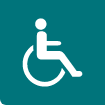
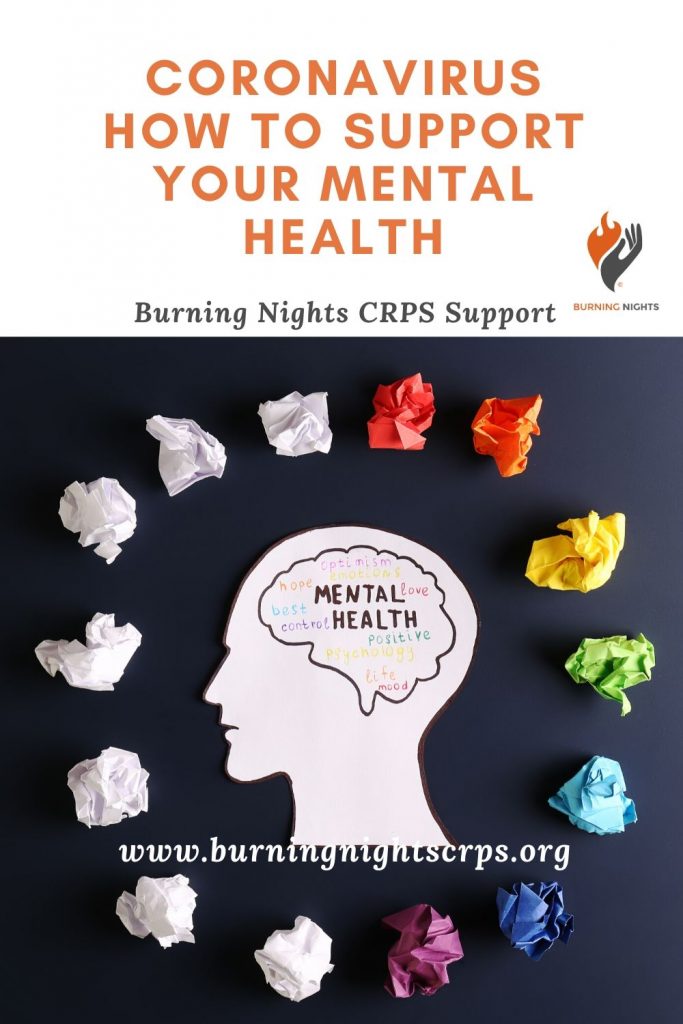
You will no doubt be worried about the coronavirus pandemic and how it will have an effect on you, your family, your finances, your job and your home. You may have been asked to work at home or you may have to be self isolating due to your condition. However looking after yourself mentally is crucial at a time like this.
You may be used to staying at home more if you live with Complex Regional Pain Syndrome but not being able to go out due to the coronavirus outbreak can bring about more difficulties for your mental health.
We have outlined 9 top tips on how to support yourself mentally during the coronavirus pandemic.
To help reduce anxiety, depression or panic, try to limit the amount of news your watch regarding the coronavirus COVID-19 pandemic. Everywhere you look on the internet, social media and TV you will find news, information, facts and figures as well as incorrect and fake news.
When you read a lot of news or watch a lot of television about the coronavirus pandemic it is easy to work up your mental health which can lead to anxiety or panic attacks. Hearing about the number of people infected by the outbreak can cause you to worry about you and your health. You then start to overthink about the pandemic and how you may become affected by it.
If you already have anxiety or panic attacks you may already have some coping methods such a taking a walk for example which at the moment due to the lockdown taking a stroll or a walk is simply not possible.
Try instead to get some coping methods that you can do whilst being in your own home, such as deep breathing exercises, doing a mindfulness exercise or use skills gained from a Cognitive Behaviour Therapy sessions.
You could just have a catch up once a day at a set time, then don’t go back to it until the next day.
Remember you can also turn off news notifications on your phone. This will help you constantly reading the news when you see notifications come up on your phone.
You can also more importantly take long periods away from the news, the TV and social media. This may help with your anxiety levels.
You can also mute certain key words or certain feeds and timelines on social media channels like Twitter so you can still use it but you don’t receive notifications or posts from certain feeds regarding the coronavirus. You can also mute Facebook and WhatsApp groups so you don’t read about any coronavirus news.
Ensure that you when you do read or watch the news that you find the latest and factually correct information. This is important. Our article on Coronavirus and CRPS has been kept up to date and is evidence based taking the fact and advice from reliable sources such as the NHS, UK Government, Public Health England, CDC, Euro CDC and WHO.
Even though you’re currently unable to meet people or go out to socialise, you can make use of technology.
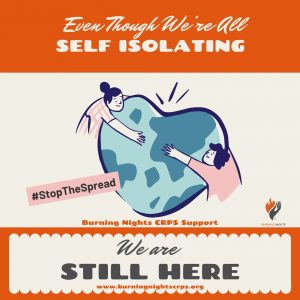 It is important to reduce the feeling of isolation and vulnerability, so keep in touch with friends and family using apps and software that is out there.
It is important to reduce the feeling of isolation and vulnerability, so keep in touch with friends and family using apps and software that is out there.
As a charity most of our services are still running normally, so you are able to contact the charity for support and someone to talk and help you get through this.
You can contact Burning Nights CRPS Support for support, help and information in many ways:
To connect with friends and family you could:
Having a routine is important even on lockdown. Making sure you get up every day, go to bed at roughly the same time every night or exercise at the same time every day all help towards improving your mental health.
It is very easy for those already living with a chronic illness to stay in your pyjamas all day. But it is important to try and stick to a routine for your mental health balance.
If you’re finding you are struggling to get up each day or find a purpose then your mental health may be suffering and it’s important you speak to someone.
Try to write down your routine or write it on your home’s notice board so you can see what your routine is.
Creating a general plan can feed into your routine. You don’t need to plan for every second of the day, just as long as you create a plan for most of the day. You can then create a routine from your plan.
Having a plan for each day is another important tip for your mental health. If you already have created a routine you could use this routine to make your daily plan.
You could write a new plan when you get up each day, before you go to bed or you could write a plan for the week.
Don’t forget to make time in your plan of the day for mindfulness, relaxation or time for a hobby.
If you live with other people try to give everyone a say in the plan and come to a mutual agreement.
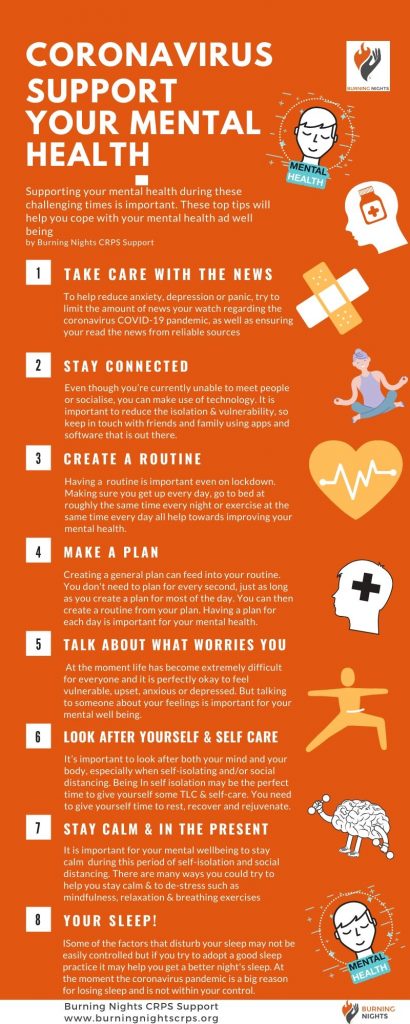
It’s important as well as making a routine and plan for your days to also make a plan for the practical matters such as food shopping and general household supplies.
If you are a clinically vulnerable person to coronavirus COVID-19 and have received a letter from the NHS and/or text messages, then it’s crucial you stay at home for 12 weeks. In this case you may need to try and arrange with friends or neighbours or to find a delivery service to help deliver any essential shopping. If you are registered as clinically vulnerable you will be receiving a box of essential goods from the U.K. Government for one week.
Some U.K. supermarkets are also trying to arrange extra home delivery slots or ways to help the clinically vulnerable.
Your local shops may also be doing delivery services as well, so it’s a good idea to phone shops in your local area and ask if they will deliver.
If you need regular prescriptions you may be able to order your prescriptions online via the app your GP uses, over the phone or via a website. You can then contact your pharmacy to enquire if they will deliver your prescriptions.
There are also a number of pharmacy delivery services available. But enquire with them to see how long it would take to set up and any cost involved.
At the moment life has become extremely difficult for everyone and it is perfectly okay to feel vulnerable, upset, anxious or depressed. But talking to someone about your feelings is important for your mental well being.
If you find you are constantly reading all about coronavirus COVID-19 or you feel you are struggling it is important that you talk to someone about your worries.
Share your concerns with someone whether that is a friend, neighbour, relative, family member. You could also talk about your worries with services such as Burning Nights CRPS Support or charities including the Samaritans, Mind or Mental Health Matters. Find out some of the helplines recommended by the NHS.
By sharing your concerns with someone you know, you could also be helping them with their concerns which may be similar to yours.
It’s important to look after both your mind and your body, especially when self-isolating and/or social distancing. Being in self isolation may be the perfect time to give yourself some TLC and self-care.
You don’t have to try new recipes or learn a new language or work constantly without a break. You also need to give yourself some time to rest, recover and rejuvenate.
Here are some tips to help you look after yourself:
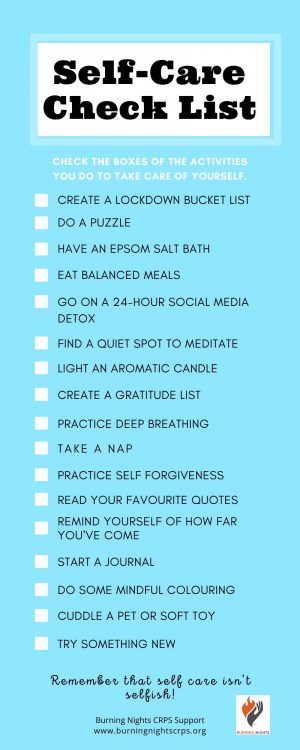
Self care is where you care for your mind, body and soul. It is where you do a deliberate activity to take care of not just your physical health but also your mental as well as your emotional health.
Most of us overlook practicing self care and keep going thinking that to self care is being selfish or that you don’t need it. This is not true. Good self-care is important to improve your mood and to reduce anxiety and depression.
Self care ideas during self isolation, social distancing and/or lockdown may include:
Interested in mindful adult colouring? Check out our Pinterest board with some great ideas and free pages for adult colouring
Adult Colouring For Cronic Pain And Distress
It is important for your mental wellbeing to stay calm and not to panic during this period of self-isolation and social distancing. There are a number of ways you could try to help you stay calm and to de-stress such as:
You also need to practice other ways to reduce levels of panic including not watching the news as much, having a social media break etc. Take into account all of the above tips.
Mindfulness can be important for mental health for some people and can be a useful tool to learn and practice especially in situations such as we find ourslves in at the moment. However it doesn’t work for everyone.
Headspace is a good app to try for mindfulness. But try to remember to keep in the present when practicing mindfulness techniques. This is crucial in the present global pandemic, as it’s easy to worry about what may happen in the future
If you’re wanting to try mindfulness, here’s a short mindfulness exercise:
When you’re feeling anxious or stressed why not try and focus on something you enjoy doing such as a hobby or pastime. It’s easy to focus on the news and everything that is going on around us in the world and to forget the things we enjoy doing.
You could also take the time to learn new skills. There are many apps and videos for anything from learning music or a different language to learning to crotchet, knit or sew. You could perhaps get into yoga or Tai Chi which would help you with your mental health.
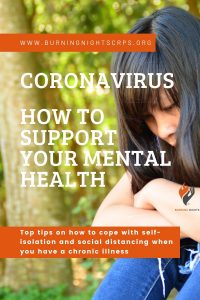
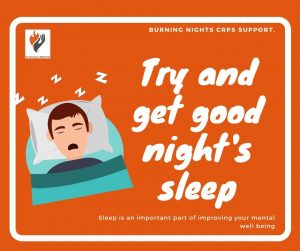 It’s easy to forget about getting a good night’s sleep during these challenging times. For those patients with chronic pain including Complex Regional Pain Syndrome, we understand sleep is an ‘added extra’ and generally sleep for chronic pain patients is very poor!
It’s easy to forget about getting a good night’s sleep during these challenging times. For those patients with chronic pain including Complex Regional Pain Syndrome, we understand sleep is an ‘added extra’ and generally sleep for chronic pain patients is very poor!
As you probably know, getting a good night’s sleep can help improve your mood and mental health. There are many reasons why a good night’s sleep can be disturbed including work problems, illness, family troubles, relationship problems, pressure from work, redundancy and more.
Some of the factors that disturb your sleep may not be easily controlled but if you try to adopt a good sleep practice it may help you get a better night’s sleep. Obviously at the moment with the coronavirus COVID-19 global pandemic is a big reason for losing sleep and is not within your control.
However practicing sleep tips such as:
Have a read of our article ‘How to get a better night’s sleep’. Sign up for our e-newsletter and be the first to read it!
During these challenging and difficult times of the coronavirus pandemic and with all the uncertainty it can be difficult. Therefore it is important to make sure you support your mental health. Here is a round up of our top tips on coping with the isolation from the coronavirus pandemic and supporting your mental health.
If you find yourself getting overwhelmed, anxious, stressed or depressed please don’t keep this to yourself. It’s important that you talk to someone about your feelings.
 As a charity we are here for you and our Support Helpline is available Monday to Friday 10am to 4pm. You can also contact us through Live Chat. Please feel free to contact us if you need to talk, a friendly listening ear, help or impartial advice. Our phone number is 01663 795055 (UK).
As a charity we are here for you and our Support Helpline is available Monday to Friday 10am to 4pm. You can also contact us through Live Chat. Please feel free to contact us if you need to talk, a friendly listening ear, help or impartial advice. Our phone number is 01663 795055 (UK).
However there are other charities and organisations who deal solely with mental health including
It is crucial to remember that the lockdown will end. There will be time in the future where you will be able to go out more and feel more free.
Written: 20/04/2020
Last Updated: 03/01/2021